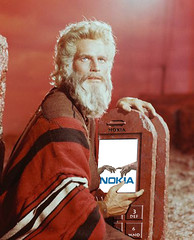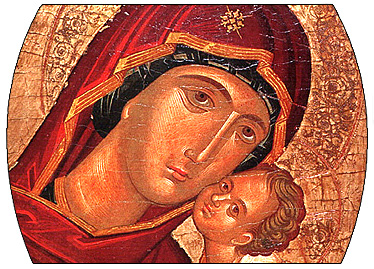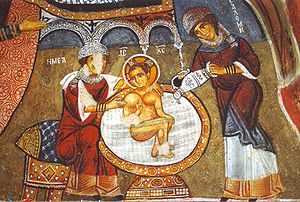You know, when I was taught to interpret Genesis as a Protestant, I was given a choice between two versions of it. One was the fundamentalist literalist version which asserted redundancy in “the text” (as people like to call it) – an “account” (another popular word) of creation in brief summary, followed immediately by a more elaborate and detailed account – a kind of built in repetition. Not a ridiculous apparatus – don’t we use such techniques liturgically? Think of the Psalms. Certainly it is far more credible, given the liturgical significance of all scripture than the alternative – the higher critical “approach” (a word it’s hard not to laugh at). The latter asserted that accounts by multiple authors were woven together by a third author, to produce a kind of poorly contrived first chapter – this editor, not wanting to lose any words of either, simply blended them in a rather ‘obvious’ way.
Besides being an assertion that the poorest imaginable editor was chosen to edit the most important work in his culture, an editor for which there is no evidence other than a particular reading of the text itself, it sort of makes Christ out to be a liar too, as the fundamentalists correctly retort, quoting Christ, “If you don’t hear Moses’ words, neither will you hear my word.” If God Incarnate were unaware that St. Moses didn’t actually write the books attributed to him, then of course we’re all just playing ‘church’. An Orthodox person doesn’t reason this way, of course – Christ’s Incarnation is the first principle and beginning point of history, so it is by that tangible reality that we judge and interpret more distant historical realities, not vice versa. Anyway, out of the two options, you can guess which one I subscribed to as a young man, but mostly out of laziness, because I wasn’t really interested to read and think through it myself. I assumed the redundancy approach. After all, I wasn’t going to shove my own head up my arse with higher criticism. I’m aware of other Protestant interpretations, such as attributing to the text an anachronistic form of mysticism, I’ve just always thought they were too inadequate to interest me enough to write out a refutation.
Recently, I’ve done a little reading (very little) of some work written by a friend of mine on another but related paleographical topic, and I began to think about the similarity of Genesis 1 with what was being suggested in another field. So I decided to take a look and see if the pattern I guessed was there, was there. It seems to be. As a result, I’m reading Genesis 1 a bit differently now. Now I think that it’s an amazingly linear (non-redundant) text, with a quite intentional set of repetitions (like “Lord have mercy” in a litany) that reflect precisely the work of one author doing a very tight presentation in which each repetition represents a unique assertion about the relationships between systems and subsystems. In other words, they are repetitions but not redundancies. They are more akin to when someone is building a logical argument: this a+b=x, b+c=x, and c+d=x. The “=x” is a repetition but not a redundancy. This part of the argument is quite linear and will lead to the conclusion that a=b=c=d=x/2. Clearly the work of a single mind elaborating a single argument without redundancy.
So here follows a loose account of the “creation narrative”, as people like to call it, in my own no doubt prejudiced and inadequate treatment, but one I think is certainly more plausible, dealing with the text structurally, than either version I learned from the Protestants:
“In the beginning God created the heaven and the earth.” The first act is a creation of a distinction between systems – i.e. Heaven and Earth. “Earth” does not mean land. It isn’t “earth” or “Earth” as we think of it, since later there is the clear assertion of the creation of land and sea at a different point in time. “Earth” here might merely mean “space”. Instead of redundancy, perhaps the creation of earth is simply the creation of the necessary space and physical properties that must antedate matter itself. One takes the cue from “heaven and earth” that these, while different systems – each their own order – are also systems sharing an order – they are interactive systems, not eternally distant, absolutely differentiated, and estranged ones.
“And the earth was without form, and void…” The next statement is a description of the system called earth. It is without form and void – which is to say that it has none of the physical properties by which we now even attempt to describe space. It is a kind of space devoid even of space. It is not space as we think of the space of the universe, which is anything but empty and without physical properties.
Yet it is a kind of substantive void – a void with positive existence. What follows seems to be the creation of the first physical property to impact the void and give it quantities and qualities capable of sustaining and indeed defining subsequent creations (subsequent modes of existence or substance?). Before the creation of those properties, however, there seem to be properties even of the void. In other words, void is something: “…and darkness was upon the face of the deep. And the Spirit of God moved upon the face of the waters.” The waters will be referred to as the stuff of the void farther on. But here it is as if the void has positive qualities – if for no other reason than that it was created, rather than a constituting a pre-existing (i.e. eternal) absence of creation. Creation itself then takes on a non-dialectical quality. Neither creation ex nihilo as creation out of a pre-existing nothing, nor yet out of pre-existing matter, nor yet out of the Creator. Creation as a much more radical act of a positive without a negative. But then comes the creation of additional properties.
“And God said, Let there be light: and there was light.” God creates light. But I question whether this light is necessarily what we think it means today, based on an experience with light that would require our existence before light’s existence – i.e. brightness – illumination. Instead, I conjecture it is the physics of light (i.e. motion) that must, again, necessarily antedate matter and other physical properties.
There is a statement, now: “And God saw the light, that it was good:” This is something “saw that it was good” that will recur from now on with the completion of each system or subsystem. It’s curious that it was not stated when God created heaven and earth. It is as if earth itself (space?) were not complete until it were given a governing or defining property – light. And when it was, then, and only then, “it was good” (i.e. a complete system).
“and God divided the light from the darkness. And God called the light Day, and the darkness he called Night. And the evening and the morning were the first day.” Previously light had been created, but now light is distinguished from its context – set free, if you will, in the vaccuum of night. And immediately this has the effect of creating time – another physical force and property – defined or characterized by movement through two principles (e.g. by movement itself): evening and morning. From here on out, the entire creation narrative will be punctuated by statements of time as the context of all further creative acts, and perhaps a co-creative force in the sense of contributing to the properties of those creations. Note that the celestial objects had not been created yet (e.g. stars) – this evening and morning is not daylight and its absence, but an integral principle of time itself – night and day as ambiguous moments through which time moves – time is an operative movement. These distinctions, however are stated a little differently. Between light and darkness is a “divide”. In other words, they are not properties of the same order. They are not like the distinction between interoperative systems – i.e. heaven and earth. Evening and morning do share that interoperative characteristic, but not as separate systems, but as properties o
f another force – time: “evening and morning were the first day”. It is not a distinction between systems but of moments (movements) within a system. It is in fact the elaboration of a system – as if to say that time moves, that that is its most characteristic property. In fact, one might summarize by saying, “God created time as a moving thing – a motion – moving through one principle to another, distinct moments, but each properties of time.” And perhaps further elaborating, “It is light, operating in the context of space, distinguished from what is not light, that co-created time.”
Again, this is speculative interpretation. But so far, you have the creation of two systems, divided from one another – heaven and earth – earth perhaps referring to the properties of space – the capacity for matter. The space is made no longer void by the creation of light. Not light as in illumination – indeed the distinction between light and dark has not yet been created – but rather the properties of light. Then the creation of a physical context for light (darkness). This immediately resulting in the creation of time, itself a force conferring, perhaps, characteristic behaviors on the previously created properties of light. In short, it seems that what what was created first are the systems and properties of systems without which nothing contained in a system can move, cohere or have meaningful existence. In fact, in summary, we might say that thus far, God created existence – a set of systemic properties which, incidentally, cannot be ascribed to God himself, who is no creature. God, who does not exist created existence as the context of all things that would later be said to exist. Put another way, God created multiple systems with multiple interoperative properties bounded in contradistinction but elaborating and being elaborated by each subsequent creation. Or in short, God created boundaries or bounded sets of physical principles and properties which allow subsequent things to exist.
One might further observe that what has been created so far is abolutely necessary to the creation of man. One cannot create man with godlike knowledge, if the capacity to know something in particular does not previously exist by means of the creation of systems and properties of systems. One cannot create godlike creative capacity unless matter exists from which to create particular things, and matter cannot exist without the properties on which matter depends, and indeed the energy of light, coming first. In short, existence must predate the existence of godlike creatures – imagine waking up insane in a cosmos in which you had the capacity to know but there was nothing to know, the capacity to create but nothing out of which creation could occur, or which even gave definition and shape (properties) to creation. Man could not come first. Existence must come first, and systems (e.g. earth) with properties of systems (e.g. light), and time for movement, and then there must finally be matter.
“And God said, Let there be a firmament in the midst of the waters, and let it divide the waters from the waters. And God made the firmament, and divided the waters which were under the firmament from the waters which were above the firmament: and it was so. And God called the firmament Heaven. And the evening and the morning were the second day.” Again, the movement of time is contributing where God is creating. This Heaven isn’t the Heaven created already “in the beginning”. This is something else, made clear by the next part, “And God said, Let the waters under the heaven be gathered together unto one place, and let the dry land appear: and it was so. And God called the dry land Earth; and the gathering together of the waters called he Seas.” This again, isn’t the Earth created “in the beginning” but something else. It’s interesting, though that the interoperative subsystem of heaven and earth refers to the universe sky and a planetary environment should be given the same names as the interoperative systems Heaven and Earth created “in the beginning”. This is, of course, the point that confuses the reading for people – is it a repeat and further elaboration on the creation of the same two things? Are the first two lines of Genesis a preface summary of what is to come? But I’m still considering that this is rather a nuanced comparison of subsystems with systems by means of the convention of naming. After all, “in the beginning” it is said God “created’ the heavens and the earth. Here it is said that God named them after dividing the waters to create them. This is the second act of naming in the account. Previously, God named “the light Day and the darkness Night” after dividing them, and we conjectured that that reflected a different kind of distinction that that between the heavens “and” the earth. We said that it seems like this indicates a sharing of properties within another system. If our initial interpretation is right, that this heaven and earth were created within Earth (the void), then the narrative is consistent.
In short, God created the first material context out of the stuff (waters) of the previously created earth (void) – one of the two interoperative systems created “in the beginning”. God created a distinction in the system between celestial space and (planet) earth which is in some way similar to the distinction between darkness and light which antedated the previously created light. Light – then light and darkness. Heaven and Earth (void) – then heaven and earth within Earth. Another way of putting it is that there is a created Heaven outside of time, and a created Earth before time, and then there is a created heaven and earth in time and depending on time. What I find most compelling is that we are given celestial space as a type of Heaven – a context that we can immediately compare cognitive so that the idea of Heaven, created in the beginning, will not have no meaning. What more direct and powerful way to provide a metaphor than naming a thing. And again, it is juxtaposed cognitively with Earth. It is as if to say, “the relationship between celestial space and the planet on which you live is a metaphor for (is like) the relationship between Heaven and that which is not Heaven, but is by comparison formless and void. Without all of this being done first, speaking words like “Heaven” to man or even offering a creation narrative at all, would be futile – there could be no cognition without the convention of comparison expressed most clearly by direct naming of a subsystem after systems. Again, the conditions of cognition (the properties of physics and the capacity for cognitive relationships – i.e. comparisons, naming) precede the creation of godlike man with cognitive capacity.
This is interesting when thinking about the theory that the observer affects the thing observed, and that the understandable properties of the universe are those which presume cognitive man, so that perhaps the previously created universe was a necessary condition of man’s creation, and the creation of man affects the properties of the very universe that man is cognitively observing just as time does.
“And God said, Let the earth bring forth grass, the herb yielding seed, and the fruit tree yielding fruit after his kind, whose seed is in itself, upon the earth: and it was so. And the earth brought forth grass, and herb yielding seed after his kind, and the tree yielding fruit, whose seed was in itself, after his kind: and God saw that it was good. And the evening and the morning were the third day.” Now God brings forth biological life: grass, herb bearing seed, fruit which is seed. Then again it’s a complete biological subsystem: “it was good.” Then again the system is subject to and sustains time: “third day”. Put another way, we can conclude that biological systems share common properties with non-biological systems, each deriving something from the other.
Then follows not only the creation of the celestial bodies but simultaneously an interesting statement of distinctions and recapitulation of the whole system dependent subsystems of 1)
space, 2) time, 3) matter, 4) biology : “Let there be lights in the firmament of the heaven to divide the day from the night; and let them be for signs, and for seasons, and for days, and years: And let them be for lights in the firmament of the heaven to give light upon the earth: and it was so.” Besides illumination, these celestial bodies are signs (e.g. symbols – hieroglyphs – paleographic instruments – musical notes – mathematics – language) – to represent all that has gone before. It is the creation of an elaborate symbolic language explaining systems, physical properties and creation. In other words, God created the stars and planets in part as a cognitive system – a set of references – cognitive matter, if you will – a cognitive material and apparatus. And God did this prior to creating animal life. Life that is capable of cognition by interaction with a cognitive material context. God created science – cosmology, physics, and the science of light and of time. The only conclusions are that God created signs for something already elaborated or for something not yet elaborated or both. But this is the creation narrative, and we’ve already suggested that each prior creation contributed to each subsequent creation as well as each subsequent creation contributing to each prior. One could argue that God created an empirical basis for cognition of material creatures subject to time precisely with a view that these creatures, once created, would elaborate that very cognition to shape the universe itself. And you thought it was just to give us a sundial or a calendar!
What’s interesting about this creation of a cognitive system is that God not only spoke it into being, as God did with all the subsystems. With major systems, God is said to have “created” Heaven and Earth. And to have “made the firmament” and “divided the waters”. All other things were “God said let there be…”. In fact, each time God says “let there be”, it is followed by “it was so”. I should stop at this point and say explicitly that what I think is happening is that systems, subsystems, and properties of systems are being distinguished by clear boundaries in the narrative, repeatedly articulated as “it was so”, “it was good”, “and the evening and the morning were the x day”. And also that I think some understanding of the character of created works is being articulated by the means by which God is said to have created them, “And God said”, “and God made”, “God created”, “and God called” – and that this also is indicating distinctions between systems, subsystems, and properties of systems. If one were to take a highlighter and mark these all in various colors and section out what was done in what order and most importantly how it relates at least to each prior order (the creation narrative is inherently linear – hence the seven days schema) but also to each subsequent order, one would be elaborating in a diagram what I am attempting to elaborate in prose. In any case:
“And God made two great lights; the greater light to rule the day, and the lesser light to rule the night: he made the stars also. And God set them in the firmament of the heaven to give light upon the earth, And to rule over the day and over the night, and to divide the light from the darkness: and God saw that it was good.” So the solar system has been created. The first thing I notice is the way in which firmament is now used – as if a previously created physical reality and construct now produces precisely a cognitive metaphor – a symbolic language for understanding further elaborated realities and constructs, in the same way that heaven and earth speak of Heaven and Earth, and this is precisely and immediately upon creating celestial bodies as signs (symbolic language) for just such an endeavour. “Firmament” here is taking on a generic quality as a term used to mean space, substance, area, the quantity or quality of category, space, time. In other words “firmament” seems to come to represent physical properties themselves – the properties of physics – any subset or subsystem of physical categories – whether subject to time or not. There is a firmament outside of time, and there are firmaments within time, including one of the space of the universe. God has created science and is using science now to explain subsequent creation, as already done in single example (not requiring an elaborate science) with heaven and earth. And time, again, plays its role in this cognition. “And the evening and the morning were the fourth day.”
So God has created all the stars and planetary objects and then… makes them “rule over” day and night – i.e. govern time. And to divide light and darkness – physical properties. In other words – let their be objects in the vacuum of space (firmament of physical properties of space capable of containing matter) that govern time and divide moments of time from one another so that the motion of time is sustained by the existence of these objects. In short, just as scientific cognition and symbolic language elaborate upon prior creation, so physical entities created subsequently affect physical entities created prior. The creation is linear, but non-linear, it is a system being shaped in arrears by each subsequent creation. And this, too, of course, suggests that man’s cognition, in so much as it is godlike, must again be predicated on the exact order in which creation has proceeded, though it will then precede to itself reshape and reform that order in accordance with that very creation of man and man’s unique capacities and needs.
Then God creates animal life. “And God said, Let the waters bring forth abundantly the moving creature that hath life, and fowl that may fly above the earth in the open firmament of heaven.” Again – firmament as a generic term describing bodies of physical properties or systems or subsystems of the larger physical universe. Then completion again. “And God created great whales, and every living creature that moveth, which the waters brought forth abundantly, after their kind, and every winged fowl after his kind: and God saw that it was good.”
So far, several patterns within a linear process. There is one non-redundant process of creation here, punctuated by hard distinctions between systems (God separated x from y), soft distinctions within systems among things of the same order (God named one thing x and another thing y), the passage (engine) of time (was the x day), and completion of systems (saw that it was good). This is very much like an engineering map, a blueprint of a cosmic systems plan.
But God then does a new thing. He blesses them (the animals). And declares reproduction. The fifth day passes. “And God blessed them, saying, Be fruitful, and multiply, and fill the waters in the seas, and let fowl multiply in the earth. And the evening and the morning were the fifth day.”
God then creates land animals (the others were sea and air animals). “And God said, Let the earth bring forth the living creature after his kind, cattle, and creeping thing, and beast of the earth after his kind: and it was so. And God made the beast of the earth after his kind, and cattle after their kind, and every thing that creepeth upon the earth after his kind: and God saw that it was good.” But this is done separately. It is done after the completion “it was good” of a subsystem and the passage of time as a boundary “were the fifth day”. Why is this a separate subsystem? It’s as if to say that the properties that each biological subsystem depends upon (sea and air vs. land) are themselves bounded as distinct systems within the same order, and by time. God then again, says of this act “God saw that it was good”.
“And God said, Let us make man in our image, after our likeness: and let them have dominion over the fish of the sea, and over the fowl of the air, and over the cattle, and over all the earth, and over every creeping thing that creepeth upon the earth. So God created man in his own image, in the image of God created he him; male and female created he them. And God blessed them, and God said unto them, Be fruitful
, and multiply…”
Finally, God makes man, creates a distinction within the same order (male and female), blesses them (second blessing) and declares reproduction in this order too. It’s interesting that this is not the third blessing and declaration of reproduction but only the 2nd, indicating a sharing of order between air, sea, and land animals, despite them being bounded by other properties related to the physics of their habitat, that is nonetheless somehow distinct in qualities from man, precisely in the area of reproduction. This further underscores the previous interpretation of those distinctions indicating relations between physical properties on which each type of biological creation are predicated. So, only two blessings and two declarations of reproduction, not three.
“And God saw every thing that he had made, and, behold, it was very good. And the evening and the morning were the sixth day.” Then what happens? God saw that it was good, again. This time saw “everything that he had made”. In short, a complete system. A complete Earth created in the beginning, but now a kosmos thriving with physical properties – shape, form, motion, light, time, biology, and cognition. The crowning act being the creation of godlike man. “and, behold, it was very good”. Completion par excellence. And the engine of time operates again. “Sixth day.” It’s as if all things being created sustain the engine of time on which they also depend for their existence.
“Thus the heavens and the earth were finished, and all the host of them.” And then of course, it’s the 7th day. The narrative of seven days shows itself as a systematic formulization of the physics/physical properties and cosmological properties of all systems and subsystems that have been created.
As we known, there is the seventh day, needing far more explication than should be done here or than I am qualified to offer, this being so significant in our Faith. But in the 4th verse of the 2nd chapter of Genesis, this “These are the generations of the heavens and of the earth when they were created, in the day that the LORD God made the earth and the heavens…”. In other words, here even the symbol/idea of “day” is now used, as were “heaven”, “earth”, and “firmament” to refer to and recapitulate the entire linear process of creation before, including, and through time “the generations”. It is as if to say, “This is the necessarily successive order of dependent events “the generations”, bounded by time “when they were created”, which is an explication of a system in which all things are unified by mutually dependency “in the day”, by the hand of God.
Well, this is all speculation. So if you take it and run off somewhere with it and let it eat your mind, I’m warning you now, that I’m not claiming this is the truth. It’s one reading subject to many personal and biased thoughts. But it sure isn’t the reading the Protestants gave me. Things might be simpler the other way, but I’ve never been satisfied with the notion that the scriptures are story books. I think they can have some value as that, but I think they were written by incredibly intelligent men who were producing a liturgical text with multiple layers of meaning (not one correct interpretation but many) lending themselves to multiple forms of cognition, and that the key thing in a creation narrative is for it to actually account for the creation logically and rationally in some way that is connected to cosmology and physics that we can at least become equipped to hear. If you’re thinking there are aspects of modern physics and systems theory (I don’t know anything about systems theory – that’s what a friend called what I’m doing), then yeah probably. I mean, how frustrating is it to look out at a universe we are understanding by means of quantum mechanics and think that maybe the only relevance of the account of creation is as a story that seems to have no bearing on anything we’re thinking the rest of the time? I think maybe we’ve just often been trained to misread it. It would be intellectually dishonest not to include that possibility along with the possibilties that it’s nonsense and that it’s just a story. What if it’s an account in metaphysical and religious language, to quote a friend, of realities that we are only rediscovering in the areas of physics and mechanics? What if it really is telling us how the universe was built, and is just as good Monday through Saturday as it is for a few hours on Sunday morning before the game?
Dammit, I want a book that explains it better than Hawking and Einstein! They’re too prone to error. If you’re going to hand me a creation narrative, it had better be *about* the creation, so I can take it outside and sit under an apple tree and contemplate motion and light and time and not thing, “well gee, this is more like Little Red Riding Hood, I think I’ll see what the latest theoretical astrophysicist is aching over right now.” Frankly, I think Genesis 1 is perhaps the most brilliant, comprehensive, and elegantly simple texts in the fields of cosmology and physics ever written. It’s just my take, but it sure beats looking for that third author, as though that would even be helpful. I want to “use” the book, not give it marks for unattribute citations.
Oh, and I know that what people are typically looking for is some sort of refutation or validation of evolution. But no self-respecting scientist that actually deals in evolutionary research believes in Darwinian evolution anymore anyway. Just ask Carl Sagan. That’s just your high school science teacher that believes in that schlock. And no reasonable fundamentalist can deny microevolutionary processes as a set of observations, though as demonstration of macroevolutionary notions, microevolutionary processes are as useless as hokum, and the result is often evolutionary intellectual voodoo. But I don’t see how Genesis 1 has any bearing one way or another. It’s just not a comment on the subject. The part everyone zooms in on is the “literal seven days” – but that question is just as nutty as “creationists” are claimed to be by skeptics. I don’t consider myself a creationist, incidentally, because I can’t see making as “ism” out of it – to me that’s all a debate over public education, which I think is just a social conditioning program for corporate states – so debating about whether there’s enough prayer or God in it, to me, is kind of sick. If the Genesis narrative indicates anything, it’s something that’s in agreement with modern science: namely, you can’t really discuss what forces are like apart from (e.g. prior to) man, because a) man’s own cognition affects those forces and b) man can only perceive things about those forces that his nature permits – his cognition conditions his perception – making his view subjective. I don’t claim anything about what is meant by “day” because the narrative specifically indicates, along with what we understand about cognition and physics, that the question would be silly. In that regard, the skeptics who ask it have much more in common with the “creationists” who define it, than either do with the author of the text and modern science.
Put another way, you can’t ask how long a day was in the creation narrative – because that presumes properties of time that the narrative is not only specifically not addressing, but I would argue it is specifically denying – and also because you’re presuming man’s cognition prior to the phenomenon, which not only is not what the narrative claims, it’s not what anyone claims – including skeptics. To be intellectually honest, you can’t beg the question by asking the narrative to account for only one of its points – separate from the others – on the basis of an assumption specifically alien to it, and even alien to what’s being used in your own realm. If the narrative is claiming that time conditions cognition of time, which I think it does, then you can’t ask it to substitute, out of hand, a much more limited and absolute an understanding of time without first refuting its initial claim. It’s a form of straw man (substituting
a fake premise in your opponent’s argument) and burden shifting (you’ve failed to substantiate the premise you’re trying to substitute). These understandings of the observer effect and cognition are current science, preclude the question of length of days, and invite a consideration of the text’s own commentary on physics, which is agreement with science. Readers must constuct questions appropriate to the actual thesis of the Genesis creation narrative.
And neither is the question of whether God exists addressed by the narrative. In fact, remember the narrative specifically indicate that God does not exist in the sense that question is normally asked – precisely because it is consumed with the creation of existence by God. So again, it offers no thesis at all on God being subject to man’s cognition, subject to understanding, categorization, or anything else subsequent to man’s existence. The text makes the claim specifically that God is prior (read inaccessible) to man’s cognition. It essentially says, “we are not telling you the story of God as much as providing a cosmological map and blueprint of physics” – or so I conjecture. By likewise indicating that God is prior to the creation of physics, to all categories and properties, created distinctions and attributes, the narrative does not even subject God to conversation or make God the topic of the conversation. Instead, it says precisely that the Creator of the universe is not a part of our presentation on creation, but is Himself the antecedent to creation and cognition, and so there is no corresponding elaboration of God’s presumed properties, whether existence or location or origin or whatever other things may be said of the physical universe. In that sense, the Genesis creation account is both true to Orthodox apophatic theology and an invitation to scientific understanding, not specifically religious rumination. It presumes to offer no commentary explaining an ‘existence’ of God. Whatever theology it offers is a negative theology, a theology conducive to the very assertion of both science and the narrative, that man’s perception constrains his understanding of phenomenon. It does this by refusing to introduce or place God into the physical and cosmological order at all, but rather keeps him beyond it. But neither does it apologize for or hide God – rather it writes for those who haven’t presumed God subject to categories that can be dismissed in the first place. To make such questions part of a debate over the creation account is to ignore the very propositions the account is itself offering. Not that it isn’t quite meaningful and can’t be explicated by those of us who are among the faithful, but that this is not the single or a single mode of reading the narrative, and such a reading would be more appropriate in the context of the liturgical community that authored the text in the first place. That discussion, what it teaches us about love and compassion, etc. – that’s really read as it’s written – by us for us. 🙂

 I’m fascinated by how no matter how something is phrased, it can be right there in front of you, simple and plain as day, but that doesn’t mean you’ll hear it. I’m not talking about some ‘self-annointed’ gnostic’s personal interpretation of a religious text – I mean something that’s dyed in the wool tradition but still, somehow, eludes the grasp. When people ask, “Why didn’t Christ tell everyone what was coming and what to do about it?” the answer is ‘He did, but that doesn’t mean “everyone” or even many people have heard him.
I’m fascinated by how no matter how something is phrased, it can be right there in front of you, simple and plain as day, but that doesn’t mean you’ll hear it. I’m not talking about some ‘self-annointed’ gnostic’s personal interpretation of a religious text – I mean something that’s dyed in the wool tradition but still, somehow, eludes the grasp. When people ask, “Why didn’t Christ tell everyone what was coming and what to do about it?” the answer is ‘He did, but that doesn’t mean “everyone” or even many people have heard him.
















![Reblog this post [with Zemanta]](http://img.zemanta.com/reblog_e.png?x-id=3209cf8d-31e6-4576-97e7-0cacdd17a378)
 Magnify, O my soul, her who is more honorable and more glorious than the armies on high. It would be easier for us to keep silence, out of fear, for it is without danger, and it is difficult O Virgin to weave complex hymns harmoniously with love. But O Mother, grant us strength to fulfill our intention. – Apodosis of Nativity, Ode IX.
Magnify, O my soul, her who is more honorable and more glorious than the armies on high. It would be easier for us to keep silence, out of fear, for it is without danger, and it is difficult O Virgin to weave complex hymns harmoniously with love. But O Mother, grant us strength to fulfill our intention. – Apodosis of Nativity, Ode IX.![Reblog this post [with Zemanta]](http://img.zemanta.com/reblog_e.png?x-id=734e5cef-dfb3-4fa8-871f-26b21edefeda)
 Rejoice O Jerusalem. Keep the feast all ye who love Sion. Today, the ancient bonds of Adam’s condemnation hath been loosed. Paradise hath been opened unto us. The serpent hath been destroyed. He who deceived our first Mother of old, hath now seen a Woman become the Mother of the Creator. O the depths of the richness and the wisdom and understanding of God! For, the vessel of sin which brought death upon all flesh, hath become the beginning of salvation for the whole world through the Theotokos. For the all-perfect God hath been born of Her as a babe, and sealeth her Virginity by His birth . . .” – the Glory be, Holy Nativity, Tone 4 (from the All-Night Vigil)
Rejoice O Jerusalem. Keep the feast all ye who love Sion. Today, the ancient bonds of Adam’s condemnation hath been loosed. Paradise hath been opened unto us. The serpent hath been destroyed. He who deceived our first Mother of old, hath now seen a Woman become the Mother of the Creator. O the depths of the richness and the wisdom and understanding of God! For, the vessel of sin which brought death upon all flesh, hath become the beginning of salvation for the whole world through the Theotokos. For the all-perfect God hath been born of Her as a babe, and sealeth her Virginity by His birth . . .” – the Glory be, Holy Nativity, Tone 4 (from the All-Night Vigil)![Reblog this post [with Zemanta]](http://img.zemanta.com/reblog_e.png?x-id=e25b4687-7e77-4a63-b211-6127beab5f74)

![Reblog this post [with Zemanta]](http://img.zemanta.com/reblog_e.png?x-id=6ea949b6-e042-4416-b043-5dcfec87e83d)

![Reblog this post [with Zemanta]](http://img.zemanta.com/reblog_e.png?x-id=d2b32a69-62d6-4a3b-aa4b-72ee94ca44d6)